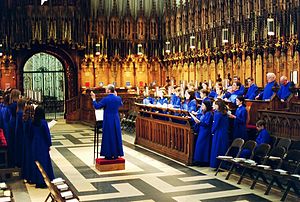Portal:Yorkshire
The Yorkshire Portal
Yorkshire (/ˈjɔːrkʃər, -ʃɪər/ YORK-shər, -sheer) is an area of Northern England which was historically a county. Despite no longer being used for administration, Yorkshire retains a strong regional identity. The county was named after its original county town, the city of York.
The south-west of Yorkshire is densely populated, and includes the cities of Leeds, Sheffield, Bradford, Doncaster and Wakefield. The north and east of the county are more sparsely populated, however the north-east includes the southern part of the Teesside conurbation, and the port city of Kingston upon Hull is located in the south-east. York is located near the centre of the county. Yorkshire has a coastline to the North Sea to the east. The North York Moors occupy the north-east of the county, and the centre contains the Vale of Mowbray in the north and the Vale of York in the south. The west contains part of the Pennines, which form the Yorkshire Dales in the north-west. (Full article...)
Selected article

The Church of Saint Oswald, King and Martyr is a Church of England church serving the village and parish of Oswaldkirk, North Yorkshire, England. It is located along the main road passing through the village, the B7363 road (Oswaldkirk Main Street),1.5 miles (2.4 km) east of Ampleforth Abbey.
Dedicated to the Christian saint Saint Oswald, it is over 900 years old and run by the Church of England. It is part of a four-parish benefice, and is in the archdeaconry of Cleveland, and the diocese of York. Notably, the future Archbishop of Canterbury and chaplain to King Charles II, John Tillotson, preached his first sermon at the church in 1661. Major restoration work was done to the church in 1886, and a large amount of the Chancel woodwork dates from this period. The church has been a Grade II* listed building since 1955, and is the oldest building in the village by more than six centuries. (read more . . . )
Selected image
Selected biography

Hedley Verity (18 May 1905 – 31 July 1943) was a professional cricketer who played for Yorkshire and England between 1930 and 1939. A slow left-arm orthodox bowler, he took 1,956 wickets in first-class cricket at an average of 14.90 and 144 wickets in 40 Tests at an average of 24.37. Named as one of the Wisden Cricketers of the Year in 1932, he is regarded as one of the most effective slow left-arm bowlers to have played cricket. Never someone who spun the ball sharply, he achieved success through the accuracy of his bowling. On pitches which made batting difficult, particularly ones affected by rain, he could be almost impossible to bat against. (read more . . . )
Selected list -

Sheffield United played their inaugural league fixture as part of the Midland Counties League on 13 September 1890 against the now defunct Burton Wanderers. Since that game they have faced 115 different sides in league football with their most regular opponent having been Blackburn Rovers, against whom United have played on 142 occasions since their first meeting on 15 January 1894. As such United have registered more wins against the Lancashire side than any other, triumphing on 55 occasions. The most league defeats suffered by United have come against West Midlands team Aston Villa who have beaten them on 59 occasions, while the most draws have been registered against cross-city rivals Sheffield Wednesday with whom they have shared the points in 39 games. The most recent new league opponents for Sheffield United have been AFC Wimbledon, who they first met on 10 September 2016 in a League One fixture. (Full article...)
Selected Did You Know . . .

- ... that the production process for Swaledale cheese (pictured) includes soaking the cheese wheel in 85% brine for 24 hours?
- ...that there are six preserved tramcars of the Sheffield Tramway at the National Tramway Museum?
- ... that Cleckheaton railway station was stolen in August 1971?
- ... that Curtis Woodhouse was a professional boxer while still playing professional?
General images -
Subcategories
Selected panorama

Topics
Related portals
WikiProjects
Things you can do
Associated Wikimedia
The following Wikimedia Foundation sister projects provide more on this subject:
-
Commons
Free media repository -
Wikibooks
Free textbooks and manuals -
Wikidata
Free knowledge base -
Wikinews
Free-content news -
Wikiquote
Collection of quotations -
Wikisource
Free-content library -
Wikiversity
Free learning tools -
Wikivoyage
Free travel guide -
Wiktionary
Dictionary and thesaurus




















































